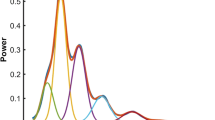Abstract
The effect of cold stress on postprandial lower esophageal sphincter competence and gastroesophageal reflux was investigated in nine healthy subjects. All subjects were studied twice in a randomized order according to a common protocol: 30 min after completion of a 700-kcal meal they put their nondominant hand in water either at 37°C (control stimulus) or at 4°C (stressful stimulus) cyclically for 20 min. Pulse rate and blood pressure rose significantly (P<0.01) during the stressful stimulus, but remained unaffected by the control stimulus. Rate of transient lower esophageal sphincter relaxations/30 min [median (interquartile range)] was similar before and during control stimulus, 4 (2.7–5.0) and 3 (2.0–4.5), respectively, whereas it was markedly inhibited during the stressful stimulus [from 5 (3.7–6.0) to 2 (1.0–2.0);P<0.05 vs control stimulus]. Rate of reflux episodes/30 min was also similar before and during control stimulus, 1 (0–1.2) and 1 (1.0–2.2), but fell consistently during the stressful stimulus [from 2 (0–3.2) to 1 (0–2.0);P<0.05 vs control stimulus]. Percentage of transient lower esophageal sphincter relaxations accompanied by a reflux episode was unaffected by stress as was basal lower esophageal sphincter pressure. It is concluded that cold stress decreases the postprandial rate of transient lower esophageal sphincter relaxations and reflux episodes in healthy humans.
Similar content being viewed by others
References
Thompson DG, Richelson E, Malagelada JR: Perturbation of upper gastrointestinal function by cold stress. Gut 24:277–283, 1983
Stanghellini V, Malagelada JR, Zinmeister AR, Go VLW, Kao PC: Stress-induced gastroduodenal motor disturbances in humans: Possible humoral mechanisms. Gastroenterology 85:83–91, 1983
O'Brien D, Thompson DG, Burnham WR, Holly J, Walker E: Action of centrally mediated autonomic stimulation on human upper gastrointestinal transit: A comparative study of two stimuli. Gut 28:960–969, 1987
Almy TP, Kern F, Tulin M: Alterations in colonic function in man under stress. II—Experimental production of sigmoid spasm in healthy persons. Gastroenterology 12:425–436, 1949
Narducci F, Snape WJ, Battle WM, London RL, Cohen S: Increased colonic motility during exposure to a stressful situation. Dig Dis Sci 30:40–44, 1985
Cook IJ, Dent J, Shannon S, Collins SM: Measurement of upper esophageal sphincter pressure. Effect of acute emotional stress. Gastroenterology 93:526–532, 1987
Anderson KO, Dalton CB, Bradley LA, Richter JE: Stress induces alteration of esophageal pressures in healthy volunteers and noncardiac chest pain patients. Dig Dis Sci 34:83–91, 1989
Dent J, Dodds WJ, Friedman RH, Sekiguchi T, Hogan WJ, Arndorfer RC, Petrie DJ: Mechanism of gastroesophageal reflux in recumbent asymptomatic human subjects. J Clin Invest 65:256–267, 1980.
Fink SM, McCallum RW: The role of prolonged esophageal pH monitoring in the diagnosis of gastroesophageal reflux. JAMA 252:1160–1164, 1984
Wyman JB, Dent J, Heddle R, Dodds WJ, Toouli J, Downton J: Control of belching by the lower oesophageal sphincter. Gut 31:639–646, 1990
Freidin N, Mittal RK, McCallum RW: Does body posture affect the incidence and mechanism of gastro-oesophageal reflux? Gut 32:133–136, 1991
Mittal RK, McCallum RW: Characteristics of transient lower esophageal sphincter relaxation in humans. Am J Physiol 252:G636-G641, 1987
Dent J, Dodds WJ, Sekiguchi T, Hogan WJ, Arndorfer RC: Interdigestive phasic contractions of the human lower esophageal sphincter. Gastroenterology 84:453–460, 1983
Smout AJPM, Bogaard JW, van Hattum J, Akkermans LMA: Effects of Cimetidine and Ranitidine on interdigestive and postprandial lower esophageal sphincter pressures and plasma gastrin levels in normal subjects. Gastroenterology 88:557–563, 1983
Dodds WJ, Dent J, Hogan WJ, Helm JF, Hauser R, Patel GK, Egide MS: Mechanisms of gastroesophageal reflux in patients with reflux esophagitis. N Engl J Med 307:1547–1552, 1982
Martin CJ, Patrikios J, Dent J: Abolition of gas reflux and transient lower esophageal sphincter relaxation by vagal blockade in the dog. Gastroenterology 91:890–896, 1986
Holloway RH, Wyman BJ, Dent J: Failure of transient lower oesophageal sphincter relaxation in response to gastric distension in patients with achalasia: Evidence for neural mediation of transient lower oesophageal sphincter relaxations. Gut 30:762–767, 1989
Cassella RR, Brown AL, Sayre GP, Ellis FH: Achalasia of the esophagus: Pathologic and etiologic considerations. Ann Surg 160:474–487, 1964
Holloway RH, Hongo M, Berger K, McCallum RW: Gastric distension: A mechanism for post-prandial gastroesophageal reflux. Gastroenterology 89:779–784, 1985
Freidin N, Ren J, Sluss J, McCallum RW: The effect of large meal on the frequency and quality of transient lower esophageal sphincter relaxations. Gastroenterology 96:A159, 1989
Holloway RH, Kocyan P, Dent J: Meals provoke gastroesophageal reflux by increasing the rate of transient lower esophageal sphincter relaxations. Gastroenterology 96:A214, 1989
Andrews PLR, Grundy D, Scratcherd T: Vagal afferent discharge from mechanoreceptors in different regions of the ferret stomach. J Physiol 298:513–524, 1980
Blackshaw LA, Grundy D, Scratcherd T: Vagal afferent discharge from gastric mechanoreceptors during contraction and relaxation of the ferret corpus. J Auton Nerv Syst 18:19–24, 1987
Ogilvie AL, James PD, Atkinson M: Impairment of vagal function in reflux oesophagitis. Q J Med 54:61–64, 1985
Chakraborty TK, Ogilvie AL, Heading R, Ewing DJ: Abnormal cardiovascular reflexes in patients with gastrooesophageal reflux. Gut 30:46–49, 1980
Cunningham K, Riddell P, Maddern G, Myers J, Wishart J, Jamieson G, Horowitz M: Relationships between autonomic nerve dysfunction, gastric emptying and esophageal transit in gastroesophageal reflux. Gastroenterology 98:A34, 1990
Author information
Authors and Affiliations
Rights and permissions
About this article
Cite this article
Penagini, R., Bartesaghi, B. & Bianchi, P.A. Effect of cold stress on postprandial lower esophageal sphincter competence and gastroesophageal reflux in healthy subjects. Digest Dis Sci 37, 1200–1205 (1992). https://doi.org/10.1007/BF01296560
Received:
Revised:
Accepted:
Issue Date:
DOI: https://doi.org/10.1007/BF01296560




